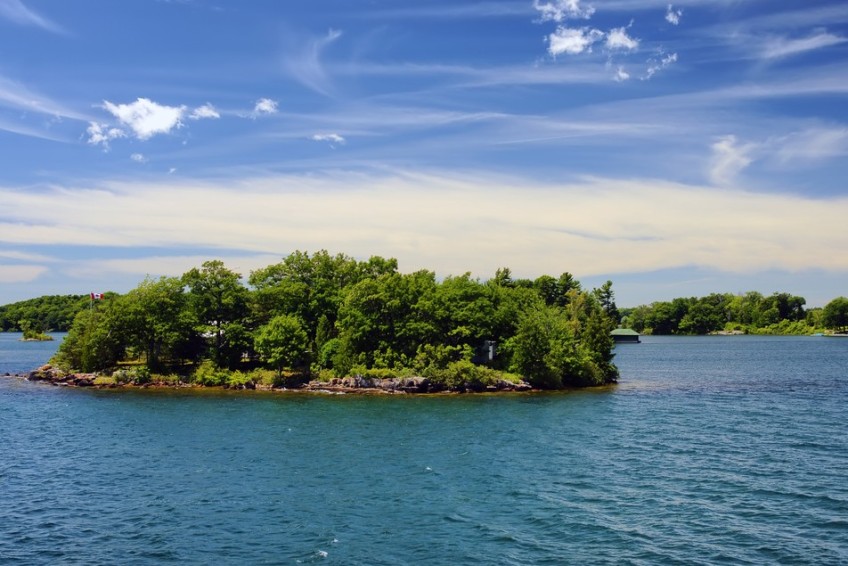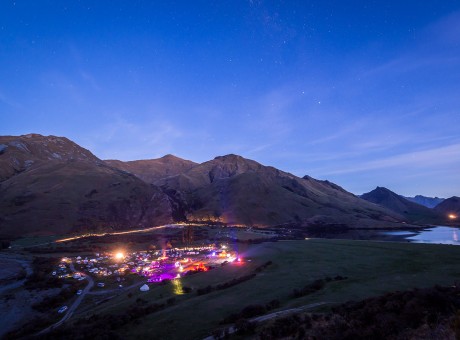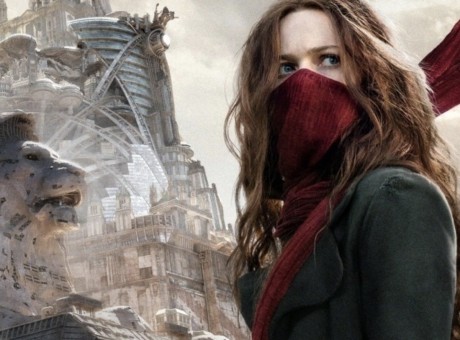Friday Fiction: Skin Island

The sailor in the distance hoists his sail successfully. The boat, sail dappled as birch bark from shadows of scraggly trees, scuds toward Skin Island. Plump clouds clot over towering Black Spruce and copper chunks of pre-Cambrian shield jut through the forest floor like crystal formations. Although beautiful, I still blame that Island. It’s why I watch the sailor now. It changed all our lives. And it’s the reason we rarely see Jesse. I don’t blame him for staying away though. Some things you can’t tell a soul.
It was warm the weekend Jesse came home from college. Close to twenty years—I was only fifteen then—and on the day of his arrival, a clear morning in early May, Grant and I were cleaning the sailboat. Grant’s friends called his little blue boat with yellow trim a hooker. In sailing terms that meant a vessel that’s come down a bit. Owning something lacklustre wasn’t Grant’s, my step-father’s, habit. He owned one of the nicest homes in the town of Marathon. A town on the banks of Lake Superior nestled in the curves of the most treacherous section of the Trans-Canada Highway. Dangerous chunks of rock broke free from cliffs on both sides of the road and fell on the shoulders, charging Moose totaled cars in seconds. It was rough but scenic, in the middle of the boreal forest full of robust evergreens and a rocky shoreline that stretched as far as the eye could see.
Grant loved that boat. He held on to it the way he held on to Mom and me: as if we were golden bits of treasure sifted from a shore lined with broken barnacles. He met Mom when we lived in the row houses next to the pulp mill—the mill closed and the smokestack torn down only last year—and back then it wasn’t the prettiest part of town. Heavy machinery groaned night and day. A putrid rotten-egg smell, formed by hydrogen sulphide emissions, wafted over the town.
Grant and his thirteen year-old son Jesse moved to town, when mining families from all over the world, drawn to the area by the Hemlo gold mines, the richest gold deposits in the world, were building houses and businesses and schools and roads back when I was twelve. I was resentful at first, by all the new families with more much than we had, and especially of him. He made my mother laugh-out-loud; this was something I had never heard her do. And I didn’t want to find out about this personality quirk through him. I ambushed her one evening, made a snide point of asking if she thought he’d marry someone with a child.
“He’s got a child too,” she’d said. She was no longer alone. She stopped wearing kerchiefs on her head. She put blush on her cheeks. He did wonders for her social life. A man with a stylish new home, good reputation and money from the hardware store he owned brought us up in the world. In a town she’d grown up in, where everyone knew her, she was suddenly somebody.
Things had been so tough for us when we were on our own. She never got tired of telling me that her own parents had turned us out when she was pregnant.
“Any child conceived in a drunken stupor on Skin Island has no place in this home,” my Grandfather had said. Townsfolk called it Skin Island because it had housed a brothel in the nineteen-forties when the pulp mill opened for business. Men came to work in Marathon from all over Canada, single men, who needed the women’s services. And remnants of the old building still stood on the north shore. A chunk of the door, a leg from a rusted bed frame and a block of wood from a curlicue mirror frame were treasures amateur historians claimed and housed in the local museum.
She described the way her Father had held the door open for her, his knuckles white on the doorknob, as she lugged a suitcase down the stairs. She applied for assistance and rented the row-house. I barely knew my Grandparents growing up. Mom kept me away for a long time. They’ve been coming around now that Grant and Mom are married. Grandfather has even let me take him out for a sail.
“Jesse’s asked for a barbecue,” Grant said.
“He’s been complaining about cafeteria food for nine months,” I said.
“Let’s surprise him with steak.”
Grant tied the boat to the dock. We got in the car and drove two blocks to the town plaza. It housed Grant’s hardware store, a pharmacy, a bank and the grocery store.
Mauve petunias in stone flower pots were on sale at the Garden Centre. Bags of soil lined the doorway. I banged my head on a display of watering cans on the way to Grant’s office. He unlocked his office door and looked over the lumber orders. He shook his head when he got to Mr. Wells’ order.
“He can’t pay for this. How he pays for all that whiskey I’ll never know,” he said and sighed.
Wells lived in the row-houses. He had three tough sons who worked after school at the pulp mill, a pregnant daughter, who always smelled like boiled macaroni and a husky dog who howled mournfully when the moon came out. I didn’t know their Mother. I don’t know what had happened to her. Wells was always angry, yelling at his kids and kicking the dog, and he once called me the spit of a drunken bull. I figured he knew, as everyone in town did, that my mother got stuck with me after getting drunk on Skin Island and spending the night in a tent with a fellow from Terrace Bay.
Grant wrote paid in full on the order.
“Those kids need a break,” he said.
He finished his paperwork and we went to the grocery store. There was a sign in the window advertising watermelon. We were lucky to get them given how quickly the town gobbled up the seasonal fruit that was flown to Thunder Bay and then trucked three hundred kilometres down that femur of a highway to our small town. I walked inside and pulled the last melon from a sagging cardboard box. The town librarian, eight-months pregnant and heaving with each step, waddled up beside me. She looked at my watermelon longingly. Mom told me that one of the pregnant women she took care of at the clinic ate a whole watermelon over the course of an afternoon. It helped to keep her feet from swelling. I looked at the Librarian’s feet. Her stubby toes were puffed out like water-logged corn kernels. I didn’t want to give the watermelon to her. I wanted it. I thought of Grant and his selflessness and handed it over.
At the cash register I placed the steaks on the rubber belt.
“Want my smoke break,” the clerk muttered. It was Michelle O’Neill. Her stiff black hair lacquered with hair spray, eyes rimmed with black kohl. She hated me. Last week during the sewing lesson in Home Economics class she sewed the bottom of my skirt together. I got a D. Her Mother never had anything nice to say to my Mom either. When my Mother got pregnant Mrs. O’Neill called her a tramp. She was the ring-leader in high school and now the head nurse at the hospital. She got paid to boss my Mother around.
I handed Michelle a twenty. She slammed the till shut and placed the change on the belt. I reached to retrieve it. She put her foot on the pedal and the rubber belt screeched forward. I fumbled and missed the money. Grant came to the till with a handful of groceries. Well aware of her games he stared her down and she stood quiet and still.
“Jesse’s favourite,” he said and gestured to the barbecue sauce with bull horns on the label.
Michelle straightened out her red smock and smiled.
“Is he back for the summer? Why don’t you bring him to our party on Skin Island tonight?”
-
Over dinner Jesse asked me about my school year. He listened as if I were the most important person at the table. I told him about the sailing club I’d started despite being mocked. I got average grades, wasn’t pretty or athletic so I didn’t have much to tell him other than how fast I could change tack.
“Good for you,” said Jesse.
Jesse never made me feel the way the O’Neill’s did. They made me feel invisible, unworthy, a young single mother’s mistake. It was easier for Jesse. Grant’s wife had left him. A doting single-father was tolerated. A single woman with an unplanned daughter, now, that was harder to accept.
After dinner Jesse presented me with a boat hook. I had a hard time docking the sailboat and this would help me reach the line. I beamed with contentment.
That evening he was restless, itching for something to do. I remembered Michelle’s invitation. When I mentioned it he stood with his face pressed up against the window, his breath beading on glass, and pretended to survey the weather. Jesse didn’t like to sail at all.
“You want to take the boat out to Skin Island now?”
“There’s a party on the Island,” I said.
I wanted to go. I didn’t often get invited to these things.
“You don’t need them,” he said with his back to me. Of course he knew what I was up to. He always did.
“Michelle will be there.”
Michelle and Jesse had dated the year before he went to college. She ditched him for one of the Wells boys, the night he’d planned to take her out to the Rossport Inn for their specialty: cheesecake trifle, layered in clear wine glasses.
I suppose that convinced him to come to the Island. He took pity on me, a shy girl with a silly longing to fit in. That’s the impression he gave when he said, let’s bust you out of that cocoon social butterfly, but I knew part of him wanted to see Michelle again.
Aboard the boat he bit his bottom lip, twitched his nose every few seconds. His black hair flew from his forehead and streamed back like a flattened sail. He was nervous but tried not to show it. I wanted to show him how strong my sailing skills were. I changed tack deftly. It was no use; I couldn’t get his attention. We docked on Skin Island and made our way through the peppery sand toward the sheen of campfire smoke.
I blushed when I saw John O’Neill. He was sitting next to his sister, the centre-of-attention, Michelle. He had the same black hair but it curled softly around the nape of his neck. His eyes were a smoky shade of blue. His droopy mouth made him look kind. That mouth hid his true nature. He was just as harsh as anyone else in the O’Neill family. Despite what I knew my knees trembled at the sight of him.
I wanted to sit down and hike up my skirt. How could I get next to him with Michelle on one side and another girl from town on the other? Michelle rose to get Jesse a beer from the Styrofoam cooler. I quickly took her place on the dented log. My toes curled over the edge of my sandals as John’s hip touched mine.
Michelle surveyed the crowd of people that had clustered around Jesse, eager to catch up, and looked for an entry point. She slid into the space to his right, vacated when one of his friends went for another round, and presented him with a beer.
As dusk drifted into night and the party slowly disintegrated, the four of us were left drinking around the campfire.
“Whore Island has a great vibe after dark,” John said. He winked and moved closer to me.
I giggled. He was so close I could smell tobacco on his fingertips. He placed his hand at the base of my neck. I gave a false shiver. I winced at the phoniness of feigning cold sitting next to a fire that was feasting on six inch logs with flames as pointy as a rooster’s comb. Nevertheless, John settled in closer to me. His clammy hands travelled up and down my back and I smiled encouragingly.
Another round of beers was offered. I’d had so much by that point I no longer cared if Jesse was about to be mangled by Michelle. All I wanted was for John to kiss me. I wasn’t used to this kind of attention. Last week at school he didn’t even know I existed. And I wasn’t sure if he would next week. John leaned in and I got a clip of a kiss before he fell backwards off the log. Assuming it was a ploy for us to lie down; I slid off and nestled in beside him. The dry grass was sharp under my shoulder; the stars bone-white above us.
I felt like one of those girls who have boyfriends, pretty and sought-after. I turned toward John expecting another kiss but he was asleep. His mouth was open and he was drooling. Inches away from his handsome face, so close to what I’d longed for, and he’d passed out. I turned away and cursed. Of course this would happen to me. I rolled away from John and picked myself up.
I heard a loud cracking. Michelle and Jesse were smashing their empty beer bottles against a rock. When a dozen bottles lay broken on the sand they ran hand-in-hand down the path toward the beach.
The fire had dulled. White ash covered the bright orange embers. I’d have to make sure to put out the fire. Douse the logs in water, or else it might spread. I picked up two empty bottles and walked toward the lake. I heard them before I could see them. Her coy laughter. His gentle huffs of assent. The slushing sound of water as it moved around their limbs. I turned away when her naked chest emerged from the water. She straddled his waist and swooped in for a forceful kiss.
I made my way back to the campfire empty-handed. We should have left hours ago.
John was still asleep, cradling an empty beer bottle. I sat by myself and listened to the logs hiss. It was my fault. I shouldn’t have brought him here. Now that she had her claws into him again, he’d inevitably get hurt. Not even Grant could tolerate her, and he had the softest heart in town.
The next morning I woke up with John’s foot under my chin. I had fallen off the log and had slept curled around his knees. My sundress was full of sand. My throat felt ashy. I was relieved that nothing had happened. I didn’t know if I could bear repeating my mother’s fate. She’d warned me about that her whole life.
Michelle and Jesse were coiled together. Their clothes were half-off. She woke up and brushed an unopened condom packet from her leg and threw it into the ashes.
“Tell anyone and—“
I nodded. I wouldn’t tell a soul.
She roused John, who avoided my hopeful smile, and they left in their motorboat.
Jesse woke up a while later and we made our way back to town.
“Dad’s probably wondering where his boat is,” he said.
“If he finds out you’ve been with Michelle. It’s not his boat he’ll be worried about.”
I needn’t have worried. We didn’t see Michelle much after that night on Skin Island. She spent most of the summer at the bar with the Wells boy. Jesse called her three times but she ignored him. We didn’t go back to Skin Island and the months moved quickly. We amused ourselves by sailing and barbecuing and at the end of August, after his last shift at the Hardware store, Jesse packed his things to return to school. I drove Jesse to the clinic the morning he was leaving to say goodbye to Mom. Michelle was sitting in the waiting room, foot tapping in agitation, trembling hand cradling her pelvis.
“I’m pregnant. It’s yours. The one weekend I didn’t use a condom,” she said.
Jesse steered her out of the clinic, grabbed his hockey bag from the car and walked her home.
I drove home and told Grant. He got in his truck and pulled away in a hive of dust. I felt a wave of anger at Michelle. I knew she would take everything from Jesse. And all she would do is party with the Wells boy. Michelle was like the zebra mussels that attached themselves to the bottom of our boat, she’d attach herself to a host and no one would be able to get rid of her. I wished he’d let her go. But what could I say? Jesse wouldn’t listen to me. Besides, I was the one who’d wanted to go to Skin Island that night. What Jesse wanted didn’t matter to me. He’d wanted to stay away from the whole lot. Why should what I want now, matter to him?
I wanted him to let her raise the child alone. Let her be the brunt of ridicule. Let her live with that little cloud of shame, the one that swelled unexpectedly, and knocked the wind out of your sails and made you feel just an inch or so smaller than everyone else. I wanted her to be penetrable, a woman I could knock around if I chose to. I wanted a little power over her.
Later that night I screamed at him, “raise a child with her?”
“I’m not abandoning my child the way my Mother did.”
He sounded like he was prepared to stay with Michelle through every diaper change, tooth eruption, bump to the forehead, school day and sick night.
I left him, no longer able to communicate without wanting to cry or hit something and went out on the patio.
On the Island in the distance wiry Jack Pine branches loomed through the brine-scented mist as two boats docked on Skin Island. Sailors from all over Northwestern Ontario were practicing for Grant’s Annual Labour Day Regatta.
Grant returned home and climbed out of his truck. He sat down and handed me the list of the Regatta participants. He depended on me to organize all the entrants’ information.
“Jesse will go back to college,” he said.
I hoped he was right. I wanted him to get out of town, deny his husky dog nature, recalcitrant while off its leash, out cavorting for days, only to come home, obedient, a pack animal at heart. I hoped that if Jesse left he would be like a black bear, solitary in these towns of north superior, camouflaged by forest and never want to come back home to her.
Jesse came out of the kitchen with a cup of tea for Grant.
“I’ve had a word with Mr. Wells. His boy will take responsibility,” Grant said.
“I can’t do that Dad. I don’t want my child to—”
“Be raised by a stepfather?” I said.
“No one’s going to know the child is yours. And they’ll never want for anything,” Grant said.
The next morning, standing beside the bus, Michelle called Jesse to her car.
She looked at him imploringly.
He hung his head.
I trembled, afraid of what she’d do. But the weight of what was within her thickening belly had dulled her hostility. She simply swore. Her words pierced Jesse’s indifference though. His face churned with grief and shame and sadness. When he stepped on that bus it was the last time he set foot in town.
-
“Put my ashes in a bottle and throw me in the Lake,” Grant had said when I’d asked him how he wanted to be buried. That spring cancer came quickly and deflated the wind from his sails within a month. I went with him to the clinic every day and Mom would play cards with us on her lunch breaks. Despite everything, we laughed and carried on like life was limitless.
He was hopeful, spent the last year of life, the year they tore the pulp mill smokestack down, after the mining families had left, the gold had all been extracted, and both the pulp and mineral industries jumped ship, raising funds to clear and revitalize what he called the Group of Seven Lake Superior Trail in the hopes of attracting tourists to town. Uncertain about their future, town council and local teachers hoped to trade scenic views and walking tours on a landscape that had mesmerized the world, immortalized through early-twentieth century paintings, for sustenance: once again relying on trees, rock and water to procure necessities.
After securing a hefty grant from the bank, right after the May long-weekend Grant was gone. We threw the bottle filled with his ashes in the cove and watched as it lay immobile in the harbour, moored in a flat lake with no wind or current.
“This is ridiculous,” Mom said and waded in waist deep water to retrieve the wine bottle. She refused to throw him out as he’d wished and kept him perched on her windowsill. She spoke to him daily.
The sun had ducked behind the hem of an oblong cloud. A few sailboats docked in the harbour. The young sailor came up the hill, black hair flattened by the wind. Up close I could see the impish nose, wide smile and thumb-deep indent in his chin he shared with his father. Easy to see he’d inherited a passion for sailing. I wondered if he’s been practicing for the regatta. He’d be old enough now, surely, to participate. I hoped he wouldn’t. I didn’t want to see him. He didn’t know me but I knew he lived in a row house with his mother Michelle and the Wells boy. She still works at the grocery store but is taking a college math course. Mom told me she solves algebraic equations between customers at the till.
As I curled up in the blanket I felt ashamed of my resentment toward this boy, who took my brother away, whose presence reminded me of the time we’d lost the only father I’d known. I couldn’t help but feel that the Island turned me into what I’d hated most: someone who sneered at a child who didn’t—and wouldn’t ever— know his own father. And the smug pride I took in knowing that it wasn’t me who got pregnant after drinking all night on Skin Island. Easier to blame that island. The curse of its history, the way it played a hand in shaping ours. Because I knew that people like Mrs. O’Neill, and my grandparents, would never change, even if it concerned their own flesh and blood. And kids from shamed Mothers are vulnerable to their disdain no matter the good grades we get, the careers we build or the families we go on to create. Skin Island, looming through the mist, clouds hovering above dimly, and its legacy proved it.
 Dayle Furlong is the author of the novel Saltwater Cowboys, a Toronto Public Library 2015 Dewey Diva Pick of the Year. Her fiction has been awarded an Award of Merit from the international literary competition, Summer Literary Seminars and is one of December Magazine’s 2018 finalists for the Curt Johnson Fiction Prize. Her debut collection of fiction entitled Lake Effect & Other Stories will be published by Cormorant Books in 2020.
Dayle Furlong is the author of the novel Saltwater Cowboys, a Toronto Public Library 2015 Dewey Diva Pick of the Year. Her fiction has been awarded an Award of Merit from the international literary competition, Summer Literary Seminars and is one of December Magazine’s 2018 finalists for the Curt Johnson Fiction Prize. Her debut collection of fiction entitled Lake Effect & Other Stories will be published by Cormorant Books in 2020.

























